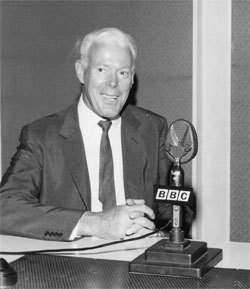Medical credibility 17 March 1980
Trevor Leggett was head of the Japanese Department of the BBC.

This is one of his broadcasts to Japan
Zubari 17 March 1980
Hello listeners – still fine weather in Britain, and the daffodil flowers are out in the parks all over London. How is it in Japan? – I saw in the Asahi [Shimbun] last week “Sumire no hana wo mikaketa. Murasaki-iro ni, hissori to saku.’” That was over a week ago, so I suppose the pansies and other flowers are well on the way.
In one of the science magazines last week, there was a report that some Chinese historians and doctors who are examining the ancient medical classics, have discovered a herbal remedy for malaria which was popular in the Han Dynasty; it is now being studied in China, and is found to be superior to the modern medicines for malaria, because it has no side-effects. However, the article concluded: “Of course, these Chinese studies will have to be repeated a number of times in a number of centres before the conclusions can be regarded as established.”
This is a very interesting remark. I can remember hearing in India about 35 years ago that a root which grows in the Himalayas, called kutika is a very effective drug against malaria, and superior to quinine. Some Indian doctors experimented with it, with favourable results; but their conclusions did not arouse any interest in other countries (or even in India) and the research was dropped.
It occurs to me now that perhaps that Indian drug kutika may be the same as the Chinese one which is now being experimented on. But at the time – and even now, as we see from the remark in the science magazine which I quoted above – there was a sort of prejudice against anything not discovered within the modern medical research system.
The fact is, that Western doctors have a suspicion about both Indian and Chinese doctors when they do research on their traditional Eastern medical remedies. There is a feeling that they have some prejudice, inducing them to claim favourable results which do not really exist. There is a doubt as to whether they are really first-class researchers.
In the case of acupuncture, in spite of the many reports from Chinese hospitals, and the operations witnessed by Western experts, there is a doubt about it. Some experts here believe it may be really a form of hypnotic suggestion.
Acupuncture has been known about in the West for 180 years. It was always regarded as pure superstition. There was a joke about it: “Acupuncture is the quickest medical remedy in the world. When the patient sees the doctor coming towards him waving a big spike, he suddenly finds that he does not feel ill at all. He is completely cured during the few seconds while the doctor is crossing the room!”
When this subject comes up, I always mention that Japanese doctors are doing research on acupuncture. Then the attitude of sceptics immediately changes. There is great respect for Japanese achievements in science, and in their integrity.
This is just one aspect of something general, namely the future role of the Japanese as interpreters of Eastern culture to the West. The Japanese researchers have access to the original Chinese documents, and at the same time they are at the peak of scientific expertise. So they are in a unique position. Western doctors cannot understand the traditional Eastern medical texts, and Westerners who could understand them, are not doctors. It is only the Japanese who can be first-class in both the fields.
I once discussed this with Dr. Arnold Toynbee, and he was very interested in the point.
Well, till next time.
© Trevor Leggett